
Hogmanay Hell: The BBC's New Year Live 98
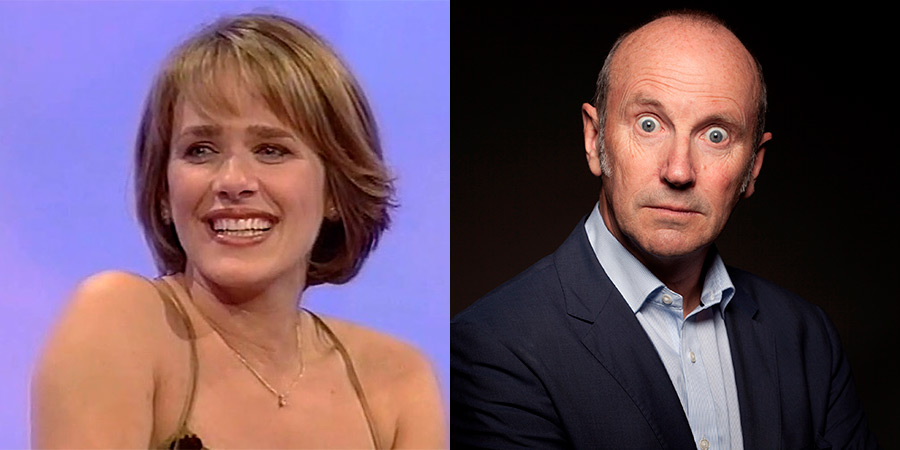
If the definition of insanity, as Einstein probably didn't actually say, is doing the same thing over and over again and expecting a different result, then British television obviously didn't get the memo. It has been happening with Hogmanay ever since the first TV camera was pointed at a kilt.
Something odd comes over television when it stays up late on a New Year's Eve. It gets a bit squiffy, a bit dazed and confused, and, before you know it, it has thrown up all over your living-room carpet.
Take Live Into 85, the BBC's bid to make Hogmanay seem like the best new thing since sliced shortbread. Eager to please tribes on either side of the border, it based itself in Scotland (the Gleneagles Hotel - check); hired a popular English mainstream light entertainment host (Tom O'Connor - check); hired a traditional Scottish singer (Moira Anderson - check); booked a fashionable southern pop group (Modern Romance - er, check?); and set out to be the most inclusive, most exciting, most up-to-the-minute thing anyone had seen on the small screen at midnight on December the 31st since the first live broadcast of Big Ben's bongs.
Then it all turned into Hogmanay hell. The obligatory band of bagpipers, after practically freezing their sporrans off in the car park while they waited to be let in to play, flatly refused to go back outside into the cold again and clogged up the set instead.
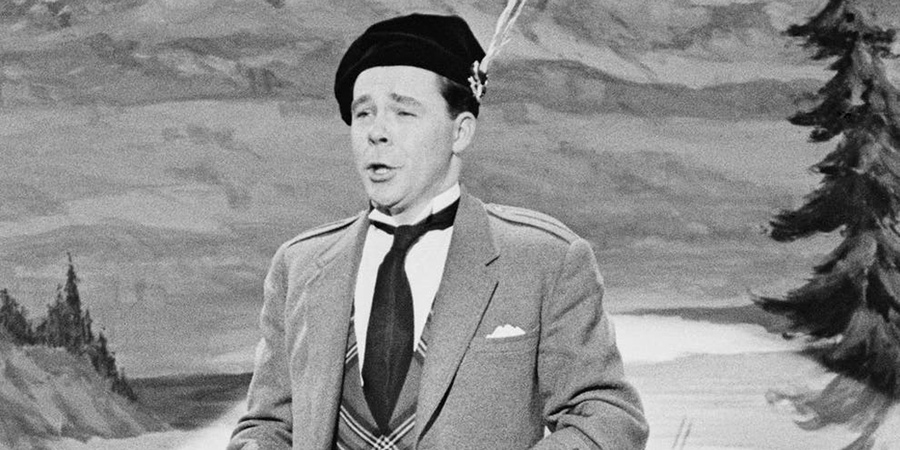
The audience, meanwhile, got progressively drunk and started having loud and rowdy conversations and arguments amongst themselves, as well as wandering in and out of shots as they staggered back and forth from the gold-garlanded toilets. One of them became so hopelessly out of control that he tried to tug at a singer's skirt as she gamely tried to get through a tune.
No one could see the studio manager; no one could catch their cues; the comedian Chic Murray, clutching a glass of Scotch and a lump of coal as the show's designated first-footer, stood swaying in front of a camera and asked where the camera was; the tired and emotional actor John Grieve tried and failed several times to remember the right words to a poem he was famous for reciting and then collapsed into a giggling heap; and Tom O'Connor, after the panicking producer had screamed into his ear to say something - anything - quickly, had just enough time to say 'You won't believe what I've just seen in the bar...' before someone down in London abruptly pulled the plug.
The full horror of that particular end of year TV event has been recounted in greater detail in a previous Comedy Chronicles article. The reverberations from it, however, would rumble on.
There would be much angry finger-wagging after that notorious debacle, with the television critics telling the television executives that they hoped their programme-makers had learned their lesson, but they surely must have known that any such dream was doomed to be dashed. The only lesson the history of televised Hogmanays teaches us is that broadcasters seem intellectually incapable of learning their lesson.
For those who continue to doubt it, let us open back up the tartan-patterned selection box that holds all of TV's New Year's Eves of the past, and pluck another broken biscuit of a programme to peruse. Hold it up, dust off the crumbs and have look at the year: it is 1998.
BBC Scotland's entry for the last slot on the last night of 1998 was a programme with the typically ingenious title of New Year Live. The programme-makers, this time around, were clearly taking no chances with an audience, they suspected, that was likely to have downed enough drams already to be deep into a drunken daze: they needed to know, in whatever BBC region they happened to reside, that what was about to be going on in the box in the corner was about the eve of the New Year, and it was going to be live.
It was with this same level of respectful attention to detail that the planning for this production was pursued. As usual, after resolving that this New Year's Eve coverage was going to be unlike any other, the team went ahead and set about making a show that would be just like any other: a terrible, hopeless, depressing mess.
It started predictably enough with the choice of location: Edinburgh Castle. That seemed sensible enough (where were they supposed to set a Hogmanay show - the Derngate Theatre in Northampton?), and, anyway, BBC Scotland already had a commercial 'arrangement' with the place.
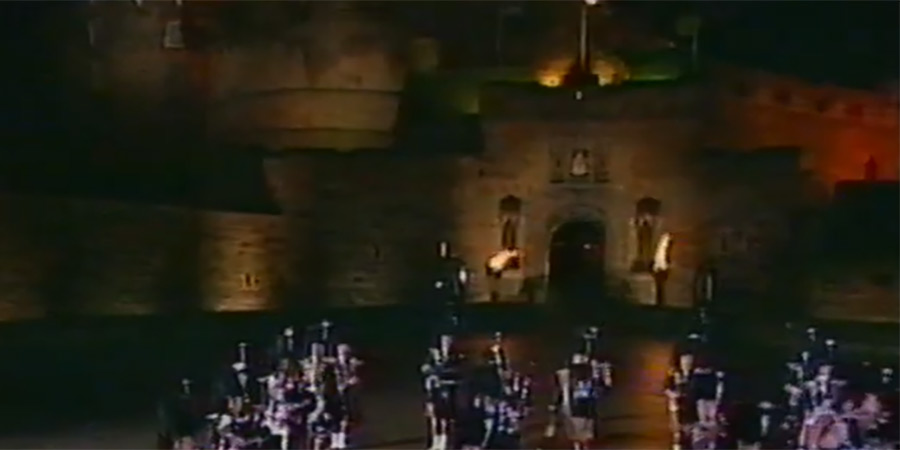
The problems started - as they always seemed to start - with the pressure on the BBC in Scotland from the BBC in London to make the programme more palatable to viewers in other parts of the United Kingdom. This always makes about as much sense as asking for the Eisteddfod to be made less Welsh or Seachtain na Gaeilge less Irish or anything else already available to all less English. The TV version of Hogmanay, however, has traditionally been broadcast on the BBC's national network to everyone in the UK (thus helping to satisfy the BBC's annual regional quota), and that fact has tended to force the poor beleaguered TV teams up in Scotland into oscillating anxiously between sticking with their national traditions or twisting with something that has those traditions so watered-down that they make next to no sense, and have no appeal, to anyone anywhere.
The most painfully interesting of these years, however, have been those where the TV team, in a state of acute confusion, has decided to stick and twist, and thus produce something that resembles the conceptual equivalent of a late-night pub brawl. 1998's New Year Live was one of these years.
The BBC's first networked Hogmanay in fourteen years, since the traumatic events of 31 December 1984, it was commissioned with a biggish budget of £400,000, along with the stern warning that it really had to be as slick and smooth-running as the previous programme had been slip-shod and shambolic. The main reason why the suits in London thought that BBC Scotland could pull this off was the fact that, in its head of entertainment Mike Bolland, the Corporation's representatives over the border were now being run by a reassuringly safe pair of hands.
Bolland had been around the block. Having started in broadcasting at BBC Scotland as an office junior, he had moved down to London to produce and direct for the BBC Community Programme Unit (making such 'open access' programmes as Open Door, Write On and the youth series Something Else) and then joining the newly-formed Channel 4 first as Youth Controller and later Commissioning Editor for Entertainment (bringing to the screen numerous innovative and very successful series such as The Tube and The Comic Strip Presents...) before moving into the independent production sector with Initial Film and Television and Channel X, and then finally returning to BBC Scotland, in 1995, as Head of Arts and Entertainment.
A very positive and likeable person, with a fine sense of humour and a keen encourager of new ideas and up-and-comic talent, he had found the BBC's set-up even more frustratingly bureaucratic than it had seemed the last time that he was there, but he was still working hard to improve both the quality and quantity of its local and network output (the excellent Comedy Connections, which began in 2003, would be one of his later triumphs). Yet another Hogmanay show was hardly high on his own list of possible commissions, but, with the promise of it being broadcast across the whole of the UK, he knew that it was a project he would have to control with care.
The initial direction he received from London left him in no doubt as to what kind of beast he would be handling. 'My son doesn't know what Hogmanay means', Peter Salmon, the then-Controller of BBC One, announced during a brusquely business-like phone call. 'So the show is to be called New Year'. Bolland knew right from the start, therefore, that he was going to have to aim for something that was more of a plain beige than a distinctive tartan.
Bearing that in mind, he decided to hire a young Englishwoman, named Heather Day, to produce the show. Day was a relatively inexperienced programme-maker whose previous work was mainly in daytime magazine shows, but Bolland evidently thought that her freshness and enthusiasm, as well as her Englishness, would ensure that she shaped a suitably UK-friendly end-of-year celebration. He would then seek to preserve at least a hint of Hogmanay by selecting the Scot John Smith, who by that time was something of a veteran of making end of year specials, to direct the show. The auld and awkward Anglo-Celtic compromise was thus once again in action.

The two 'party hosts' chosen were the proud son of Perth Fred MacAulay (a genial comedian and radio presenter), and the beaming Glaswegian Carol Smillie (not only the reigning Rear of the Year but also the presenter of the most popular daytime programme currently being shown in the evenings, Changing Rooms). This seemed as close to a dream team as the show could currently get, seeing as both of these Scots were fairly familiar figures on both sides of the border as far as TV audiences were concerned, and both, as presenters, were used to the challenges of live broadcasts.
When it came to booking the guests, the production team knew that they would have to set their sights quite high - 'I want big names on it', Peter Salmon had insisted. 'Big English names!' - so countless calls were made to the top agents down in London. The problem was - as it always was (and still is) for Hogmanay shows, regardless of whether they were going to be out and proud or hidden shivering behind an Anglicised façade - was that none of the big names, and precious few of the not-so-big names, wanted to perform live on New Year's Eve (unless the gig was an obscenely well-paid one in somewhere like Dubai).
The production team, reeling from all the rejections, thus came up with quite a sensible response: they started offering the option of allowing the big names, and even a few of the not-so-big names, to record their performances at an earlier and more convenient date so as leave their own festive season alone. Still, in spite of such concessions, the rejections kept on coming.
Then, suddenly, the team got lucky. The band Duran Duran, who, although not quite as big as they had been a few years earlier, were still quite big, agreed, for reasons best known to themselves, to do the gig.
The team was ecstatic. This coup, they reasoned, was surely going to open the floodgates and all kinds of other famous people would now be washed on a big wave up to Edinburgh.
They were, alas, mistaken. After many more fruitless phone calls, the best of the rest that they could persuade to come up was the former boxer Frank Bruno, some of the McGann brothers, the EastEnders actor Samantha Janus, the singer Sarah Brightman, an all-female classical act called The Mediæval Bæbes and a black gospel choir. It would, concluded the exhausted production team, have to do.
Things were already starting to fall apart. The producer, Heather Day, having been parachuted in to Anglicise the affair, was criticised by others behind the scenes for not appearing to understand any of the Hogmanay traditions, which seemed more than a little unfair but nonetheless ensured that whispered bickering about the shape the show was taking would continue all the way through to its transmission.
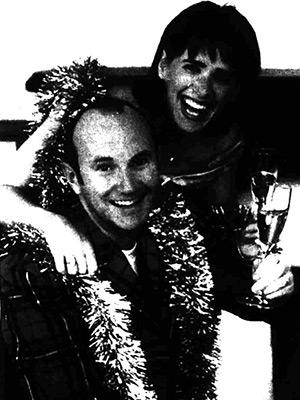
Then there was the failure to publicise the programme. This kind of awkward hybrid of an entertainment show always requires plenty of careful promotion to capture people's attention in a cluttered set of festive schedules, but on this occasion it received anything but careful promotion.
The TV journalists in Scotland, having already heard the word that the Sassenachs had taken control of the proceedings, ranted in their columns about the BBC 'cancelling Hogmanay', and showed no enthusiasm whatsoever for the venture. Their counterparts in England, meanwhile, having heard the word that there was still likely to be at least a scintilla of Scottishness about the programme, mostly preferred not to preview the show at all.
Its two star presenters, meanwhile, were turning out to be of no great help in selling it to a network audience. The normally upbeat and hyper-positive Carol Smillie, surprisingly enough, kept scoring PR own goals about the show at a steady rate in the days prior to the broadcast itself. 'New Year doesn't matter, but Christmas is really important', she told the BBC's own press office, in an interview organised expressly to promote her New Year's Eve show. They gave her another chance: 'Hogmanay isn't such a priority for me,' she added. They gave up.
Fred MacAulay (who was, evidently, hugely excited about the show) might well have proven more on-message with his promotional interviews, had anyone actually bothered to interview him. As it was, the only thing that prospective viewers could glean about this forthcoming televisual treat was that one of its hosts wasn't really a fan of the thing she was supposed to be celebrating, and the other one appeared to be silent.
Time, however, would not wait for the BBC to get its act together, and when the big day came, there was the show, tucked quietly away in the listings, in every part of the UK, at 11.40pm. Rather than attracting people who specifically wanted to see a different sort of not-entirely-Scottish show from Scotland, the programme, like so many others in that seasonal slot, was left to rely largely on those who simply wanted something to have on in the background while knocking back the beer and Baileys as they waited impatiently for midnight.
Viewers south of the border came to the show after watching BBC One's uncharacteristically lively and accordion-free comic review The End Of The Year Show With Angus Deayton. Viewers north of the border arrived having had a helping of the ever-artful Scottish football-themed sketch show [h]Only An Excuse?], followed (as usual) by a five-minute skit from Rikki Fulton's comically downbeat creation the Rev I.M. Jolly. If any of them were expecting the traditional small screen roamin' in the gloamin', they were in for quite a surprise.
This year's end of year show certainly opened up in one of the most dramatically un-Hogmanay ways imaginable: Carol (sporting a scarlet faux-fur coat) and Fred (engulfed in tartan) were helicoptered into Edinburgh Castle esplanade and then whisked off up to the Great Room on the backs of two growling Harley Davidson motorbikes, where they announced, with panting pride and excitement, the opening act of Duran Duran. Then, as the defiantly unseasonal sound of Rio started wafting through the castle's chilly interiors, the tone was set: this was going to be different.
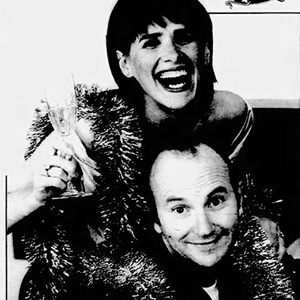
The problem was that it was not different in a good way. The two presenters, for example, appeared to have subscribed to the theory posited by the 18th-century German thinker Heinrich von Kleist that one should speak first and think second, because little that came out of their mouths seemed to have been mentally processed in terms of coherence, relevance or entertainment.
They had started badly enough. A beaming Fred announced, as if anyone needed or wanted to be reminded, that Carol had won 'The Rear of the Year award, 1998!' A beaming Carol then duly showed us her rear. A still-beaming Fred then showed us his rear. A still-beaming Carol then started cackling with amusement.
Fred then told a Christmas cracker kind of joke: 'New Year resolutions are like breaking wind', he revealed. 'They should be done in private!'
Perhaps sensing that this was not entirely likely to get even fairly tiddly folk rolling on the floor laughing in their homes, Fred, showing quick if not sound thinking, decided - during an unfunny sketch with Samantha Janus - to sit on a cheesecake, and then, once again, he showed us his rear. Then Carol, the real Rear of the Year, once again started cackling with amusement.
Fred's comedy then got a little more daring, though not really any more effective, during the 'fun' that followed. At one stage he even felt it would be a good idea for him to shoehorn-in a gag about Bill Clinton, Yasser Arafat and the West Bank, but not even Carol cackled about that and he reverted hurriedly to more references about rears and years.
In addition to all of this humourless havering there were, inevitably, myriad technical mishaps. For one thing, neither presenter, searching for their various smudged chalk marks on the castle floor, seemed very sure of where they were supposed to be standing or what they were meant to be saying or doing from one link to the next, so there were more than a few awkward pauses and anxious glances as they looked for the autocue or searched for the right camera. Carol, the more experienced of the two on TV, was usually slightly quicker to get her bearings, so there were several jarring shots of her grabbing a frightened-looking Fred and pulling him back into view.
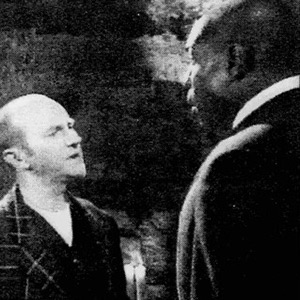
Then there were the recorded sequences. Prompted by the unavailability of some of the guests on the night, these pre-recorded skits and sketches, featuring the likes of a dazed Frank Bruno and various other southern-based celebs, were supposed to be dropped seamlessly into the live coverage. The problem with this was that, for reasons best known to those in the production gallery, these inserts often came in far too early, cutting off the beaming Fred and Carol in mid-waffle. On one especially abrupt filmic intrusion, the beaming Fred suddenly became the furious Fred as, unaware that his microphone was still on, he launched into a sequence of salty expletives that went out across the whole of the UK as he inquired as to what on earth was going on.
There were numerous other embarrassments. Sarah Brightman, for example, was obliged to sing while standing in a pair of Dr Martens boots, which had been nailed to the ground, because she wanted to sway around as she performed. There was also a decidedly odd rendition of Auld Lang Syne by a gospel choir that probably had some traditionalists stamping on their Tam o' shanters in anger, a wedding (yes, really) of a member of the castle garrison, and at another point in the proceedings a strange group of angry-looking Scots, wielding axes, invaded the makeshift stage, possibly to dance or else by way of a protest - it was never very clear. 'The whole show', Mike Bolland would later admit with a groan and a grimace, 'was a complete and utter shambles'.
Once the clock struck midnight and the big and noisy firework display had fizzed and faded away, a red-faced Bolland - still stunned by what he had witnessed - joined the crew as they walked through the bottle-strewn Edinburgh streets to their temporary base at the George Hotel, where, desperate to drown their sorrows, they all proceeded to get well and truly drunk. The nightmare, however, was still not quite over.
Extremely early the next morning, a distinctly worse-for-wear Bolland managed to make his way home, feeling such bad indigestion pains in his chest that his family, fearing a heart attack, called for an ambulance. Before he knew what was happening, Bolland found himself en route to hospital, bathed in flashing blue lights, with an oxygen mask strapped tightly to his face.
'What do you do?' asked one of the medical staff as they hurtled through the still-dark streets. 'I work for the BBC', came the muffled response. 'Och,' said the paramedic, 'did you see that Hogmanay show last night? It was fucking TERRIBLE!!!' He could only wince in agreement.
Bolland, once checked out, was soon given a clean bill of health. New Year Live would not be so lucky.
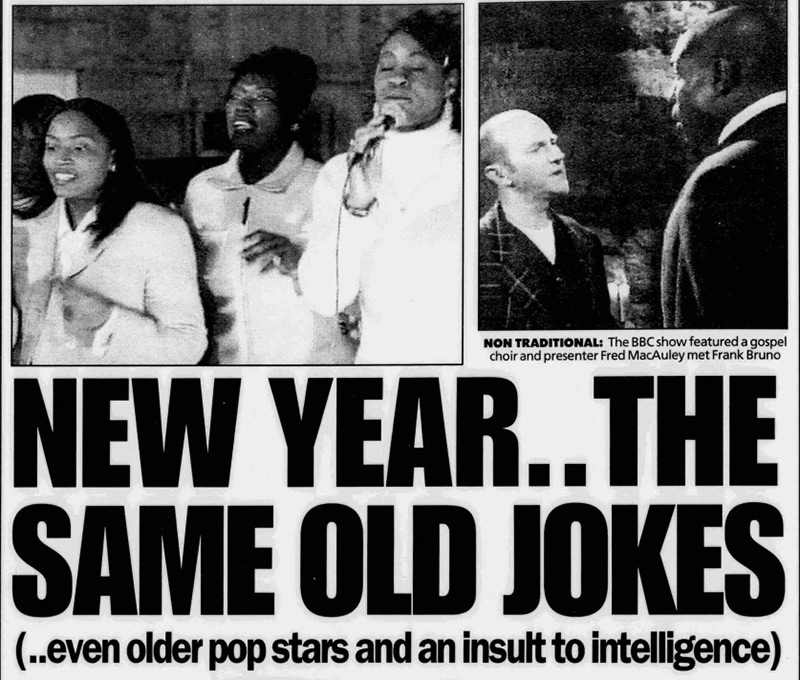
The critics were not kind. 'Anyone who still believed Hogmanay television was worth raising a glass to was dealt a short, sharp shock in the closing minutes of 1998,' wrote the reviewer for Scotland's Daily Record. 'Never mind tartan and shortbread, viewers were served tripe by television bosses'.
Others north of the border complained that the two hosts 'seemed lost' and 'clueless'; the music was by 'has-beens' who sounded 'half dead'; the sketches 'pathetic,' 'amateurish' and 'insultingly lame'; the crowd participation 'miserable'; and the brief and half-hearted spots of Scottishness were merely proof 'that Hogmanay has been Anglified beyond all recognition'.
One particularly carnaptious Caledonian critic went so far as to see the whole sorry thing as some kind of devious TV conspiracy against the 'second class citizens' of Scotland, imagining the bosses in London saying: 'Give them a crap comic in a tartan suit and plenty of pop pap. For heaven's sake don't let the Jocks think they have any quality culture of their own. You know where that might lead'.
The reception was no better elsewhere in the British Isles, where, even in this deeply diluted form, it was still dismissed by many for being 'too Scottish'. Among the few London-based reviewers who bothered to mention the broadcast at all (most of the others were still far too busy complaining about the poor quality of the Christmas schedules), one called it 'dire', another 'desperate', while a third simply dismissed it as 'a waste of time and money, and I would have added "effort" if only it had looked as though any had been expended'.
New Year Live was, as even most of the people involved would later admit, one more of television's many end-of-year mistakes. Only 950,000 viewers watched the show in Scotland - 350,000 viewers down on the previous year, when the show was made specifically and exclusively for a Scottish audience - while the figures in the rest of the UK were barely any better. The hybrid Hogmanay, as usual, pleased no one at all.
It is tempting to suggest that TV is missing a trick or two here. It might dent the BBC's regional quotas, but it could always leave BBC Scotland alone to please viewers in Scotland, and get its other production bases to make much more of an effort to please viewers in, respectively, England, Wales and Northern Ireland. It might, alternatively, stop draining existing national traditions of their distinctive cultural identity, and start making something new that actually tries to be genuinely inclusive and reflective of what, if anything, the United Kingdom actually now is supposed to be. Could such a socially positive, culturally constructive, technically imaginative experiment really be any worse than the slop that is still served up in the last few minutes before midnight?
It is probably only a matter of time, however, before the problem of Hogmanay - like the problem of news and current affairs, religion, ethics and opera - gets 'solved' by moving it to Manchester, which is apparently the all-purpose and definitive solution for anything now deemed 'not national enough'. Until then, however, we can only hope that some of TV's auld acquaintances really will be forgot, and some better memories come to mind.
Help us publish more great content by becoming a BCG Supporter. You'll be backing our mission to champion, celebrate and promote British comedy in all its forms: past, present and future.
We understand times are tough, but if you believe in the power of laughter we'd be honoured to have you join us. Advertising doesn't cover our costs, so every single donation matters and is put to good use. Thank you.
Love comedy? Find out more
